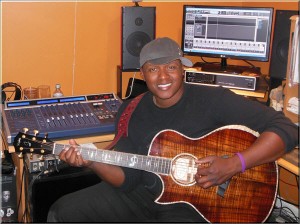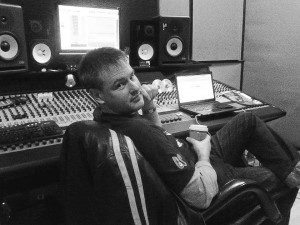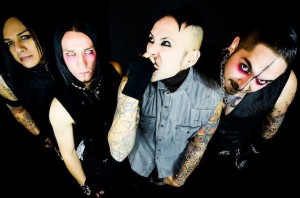Songwriting is such an intricate art-form. Some approach it seriously, while others find their best work casually writing with others in a lighter atmosphere. There are a lot of moving parts, and in my opinion a lot of magic and unexplainable voodoo that go into a song that simply resonates with the general public for unexplainable reasons. Do you think Afroman thought his song “Because I Got High” would have over 45 million views on YouTube when he wrote it? https://www.youtube.com/watch?v=WeYsTmIzjkw
There are so many different and interesting ways to write songs, and SONAR is a DAW that literally becomes your writing partner. From inspiring drum grooves with Addictive Drums, to the ease of workflow with loops, to quickly shaping sounds to inspire a more creative path, SONAR is way more than your industry-standard “recording” software. It’s a place you go to when you want to creatively craft a masterpiece. We thought it would be interesting to hear from some day-in-day-out professionals who depend on SONAR for their livelihood.
Javier Colon
Singer-songwriter
Major Label Recording Artist
International Touring Artist
Winner of Season 1 “NBC’s The Voice”
Cakewalk Artist Relations: What is your main approach to songwriting?
I’m usually an acoustic guitar guy when it comes to songwriting but sometimes I’ll sit at the piano and get inspired and start writing. I’ve worked with a lot of producers and songwriters that build a track and then write to it – we’ve come up some great songs that way too.
Cakewalk Artist Relations: How does SONAR help with the songwriting process?
Javier: SONAR helps me tremendously when writing because it’s so flexible; you can change things in a session as quickly as you can change your mind – this really helps the songwriting process. When I write a song there is a constant process of elimination. I’ll think of a line, and I might like it for a minute, and then toss it out. There are also ideas that I absolutely know will make it into the song. I constantly record as I go so I don’t forget ideas that I really love – SONAR’s arranging workflow really keeps this process creative and easy for me in terms of songwriting.
Also, X3’s looping and comping functions really help with songwriting. I record chord progression loops so I can come up with melody ideas in real time. Then I’ll go back and audition all the ideas easily to get a good idea of what melodies are better than others. SONAR X3 has really been a great tool for songwriting for me.
Cakewalk Artist Relations: What is one of the recent songwriting successes or projects you have had or really enjoyed? What was the workflow or songwriting process like for that?
Javier: I recently wrote with a good friend of mine, Josh Kelley, who is an amazing singer/songwriter/producer. We do a few events together every year where we get to sing together. It seems like every time we are at an event or show, we come up with some amazing ideas for songs. A couple weeks ago we were just outside of Chicago when we came up with a great idea. We worked on it in the hotel until we had a solid foundation for the song and now we will be hooking up in a couple weeks to finish it.
Cakewalk Artist Relations: Do you have any advice for songwriters new to the space?
Javier: I would say to try something out of your comfort zone if you haven’t already. I’ve learned a lot about myself as a writer and a musician when I’ve been challenged to write a song that wasn’t necessarily in my genre or “wheelhouse”. I’ll do co-writes sometimes with other songwriters and every now and then we start a song for another artist who is stylistically different than me. I jump in the booth to demo the song and all of a sudden, the song feels tailor made for me! I love when that happens!
Blade
Platinum Producer, Songwriter, Multi-instrumentalist
Dallas, TX
Cakewalk Artist Relations: What is your main approach to songwriting?
Blade: For me it varies and really comes down to what inspires my creativity on that particular day. I come from a hip-hop background and actually started out as a rapper before I began producing. I started producing so my friends and I could have tracks to rap over, so early on in my career everything usually started with developing and subsequently writing to the track.
As I grew as a producer, and started to journey into other genres such as R&B, pop, rock, etc., I started to try new things and take different approaches. Sometimes I might come up with a chord progression I like on the piano and myself, or a songwriter I work with will write to that and build from there. Other times I or one of my songwriters may have an idea in our head, and then I’ll bring structure and put music to it. I try not to put myself in a box or a set-way of working, because you never know what situation you may be in or where the creative inspiration may come from. I like to just let the music flow naturally.
Cakewalk Artist Relations: How does SONAR help with the songwriting process?
Blade: SONAR allows me to get ideas out quickly. I can pull up True Pianos or even Dimension Pro and quickly start brainstorming with some chords on the piano. I really love Z3ta+ 2 as well. If the piano chords aren’t doing it for me, I can usually turn to Z3ta+ 2 and get some nice, inspirational synth lines going that will get the creative juices flowing. Also, the addition of Addictive Drums has been excellent for those moments when I want to build a production around the drums and I’m looking for more of a live/acoustic type of feel rather than sampled or electronic drums.
Another great addition to Sonar has been Melodyne. Sometimes when you’re songwriting you just need to get the ideas out and it’s not so much about getting a perfect take. The Melodyne ARA integration has made it really quick and easy to fix up some of those less than stellar takes so you can stay more focused on creating and coming up w/ new ideas rather than agonizing over trying to get a decent take.
Cakewalk Artist Relations: What is one of the recent songwriting successes or projects you have had or really enjoyed? What was the workflow or songwriting process like for that?
Blade: Last year I produced the bulk of the songs for the Bravo TV show The Kandi Factory with Grammy-winning songwriter and reality TV star Kandi Burruss. It was challenging because we had to come up with production and song ideas quickly for each contestant based on their story lines and backgrounds, all while sticking to a tight production schedule for television. The show didn’t quite have the success that was predicted, but still I enjoyed the process of being in the studio and collaborating with a songwriter of Kandi’s stature and watching my ideas come to life on each episode.
More recently I’ve been collaborating with an extremely talented artist/songwriter by the name of Dezi Trible. Most producers will tell you that having a “go-to” songwriter is invaluable and often times hard to find for many different reasons. I feel like I have finally found that “go-to” songwriter, and I am very excited about the material we are coming up with. I feel like we are developing something unique and this has given me creative inspiration again in a way I haven’t had in a long time. Even though I am a good songwriter myself, I often would prefer to turn that duty (or at least the majority of it) over to someone who specializes in that area so I can focus more on my role as a producer. She allows me to do that with confidence. I have a vast range as a producer/songwriter, as I pride myself on not being pigeon-holed into one genre. It’s hard to find a songwriter who can keep up with the way I jump around from genre to genre and consistently deliver ideas that are authentic to that particular genre. She is able to do that, and I can’t wait to unveil some of the work we’ve been doing.
A lot of people know Kandi and I worked together years ago on the Real Housewives of Atlanta, as I produced the music for reality star Kim Zolciak’s infamous song “Don’t Be Tardy”. As a result, the song became the theme song for her spinoff show which is also entitled “Don’t Be Tardy”. The show just started it’s third season on Bravo on July 17, 2014.
Cakewalk Artist Relations: Do you have any advice for songwriters new to the space?
Blade: Keep working and exercising your creativity. Collaborate with other talented people. No matter how good you think you are, you can always learn something from someone else and how they approach things. Always have a way to write down or capture your ideas because they can come at any moment. Make sure you also take the time to learn the business aspects of songwriting. You don’t want to look up one day and realize that you’re not getting properly compensated for your ideas and hard work.
Murray Daigle
Major and Independent Music Producer and Songwriter
Toronto, Canada
Cakewalk Artist Relations: What is your main approach to songwriting?
Murray: It depends on the style of music, the pitch I’m working on and my co-writers. For dance and electronic, beat-driven tracks, I almost always start with building a nearly complete instrumental. Then when I get in a room with top-liners, I will adjust or make changes to make the vibe work for everyone. When it comes to rock music, I always start with a guitar. It’s my first instrument, so I can work quickly on riffs, chord structure and parts. Overall, I usually start with whatever inspires me first… sometimes that is just a lyric, concept, a simple piano or guitar line, a drum beat or even just a drum sample that I like. I think ultimately topline is the most important element to a song, and everything should work around melody and lyric.
Cakewalk Artist Relations: How does SONAR help with the songwriting process?
Murray: SONAR is essential to my writing at this point. Producing and writing have basically merged into one process because of the incredible power of DAW software. Having the ability to create, organize and quickly recall synth presets and channel settings allows me to focus on executing ideas instead of messing with gear. The browser section and loop/sample preview is amazing for digging into my huge library to find the perfect building blocks for any style of track. It also allows my collaborators to hear and help make choices and guide the vibe of the song. The ability to comp multiple takes of vocal and instrumental ideas to compare and layer is also a big part of the song building process for me. Of course, functions like looping and time stretching have become essential as well. The best part about SONAR is that on a brand new, clean install with no addition 3rd party software, I have the tools to make records right away. All the core tools are there and they work and sound incredible.
Cakewalk Artist Relations: What is one of the recent songwriting successes you have had?
Murray: Right now I have another single by the band Neverest climbing the charts here in Canada. I have had several hits with these guys, including a gold record and a #1 video. I have a big release coming this week by Adriiana (ft. iSH) here in Canada. I wrote her first hit when she was 14 years old!
Cakewalk Artist Relations: Do you have any advice for songwriters new to the space?
Murray: Write loads of songs! What people don’t realize is how many songs pro writers actually write. 2 songs a week minimum… and I mean finished songs, usually fully produced and mixed. In a really good week (with no life) I will do 4! And… don’t be precious with songs and ideas. Every song you write will not be a hit. Learn to collaborate and to give and take. All the best and most successful music I have written has been a team effort.
Yogi Lonich
Producer/Songwriter/Artist/Professional Touring and Studio Musician
Los Angeles, CA
Cakewalk Artist Relations: What is your main approach to songwriting?
Yogi: I tend to write with my acoustic guitar and improvise vocal melodies simultaneously. The lyrics usually come after the chords and melodies are written.
Cakewalk Artist Relations: How does SONAR help with the songwriting process?
Yogi: I actually don’t turn on the computer until the song is completely written. At that point and with the help of X3’s global templates plus all the editing capabilities, I’m able to experiment with different arrangements of the song.
Cakewalk Artist Relations: What is one of the recent songwriting successes or projects you have had or really enjoyed?
Yogi: I recently completed a video single called “Sitting on Top of the World” http://youtu.be/OyJz0DqhQm0. For this particular song, I collaborated with drummer extraordinaire, Toss Panos. The featured chord instrument I played is the banjo. I jammed with Toss and cut drums at his studio, then imported the drum stems into X3 and recorded the rest of the tracks, mixed and mastered right here at my studio all in SONAR X3. It’s pretty amazing these days to be able to get this quality of a piece recorded, mastered and out the door with pro software from a project studio.
Cakewalk Artist Relations: Do you have any advice for songwriters new to the space?
Yogi: Working on a DAW such as X3 allows one to work quickly and efficiently through the initial tracking all the way to the final mastered bounce. I recommend having templates set up so that you can concentrate on creativity. With a library of soft synths as vast X3’s offerings, it’s important to become very familiar and take note of your favorite sounds. I used to forget the locations of specific patches/banks for certain sounds. I’ve saved loads of time making simple lists and also organizing things in X3’s browser.
Also, you will save a ton of time using custom FX chains for effects bins and for individual channels. Learning FX Chains and getting your own library going will help you focus more on songwriting and less on building effects – this goes for Track Templates as well. Learn to use the automation features too!
Norman Matthew
Lead vocalist/guitarist/songwriter for International group Murder FM
Owner of The Sound Foundation – Dallas
Cakewalk Artist Relations: What is your main approach to songwriting?
Norman: For me, I have multiple instruments lying around in my home studio. Different things inspire different moments and movements within me and my ear. So really, anything could create a moment of inspiration. More often than not though, it is my guitar or something in Z3TA or Dimension Pro that really gets me going, and SONAR gives me flexibility and versatility on the spot.
Cakewalk Artist Relations: How does SONAR help with the songwriting process?
Norman: SONAR X3 has been the key element in everything I have done in the past few years in my production and songwriting. With the ability to setup templates, when inspiration hits, in a matter of a few keystrokes I have Addictive Drums, Dimension Pro and my songwriting template fired up and ready to go. I don’t waste time having to setup. Between touring, owning a studio, my Artist Development School here in Dallas, producing and writing for/with other artists and now a baby, time and flexibility are EVERYTHING- and SONAR affords me both of these on top of the ability to flex my creative muscle as far as my ear will go.
Cakewalk Artist Relations: What is one of the recent songwriting successes or projects you have had or really enjoyed? What was the workflow or songwriting process like for that?
Norman: I really enjoyed remixing CIVIL TWILIGHT and HOLLYWOOD UNDEAD. I also recently produced/released 4 artists in THE SAME week in May 2014, of which all were being worked on simultaneously. The workflow was more like a music-Hail-Mary; I just went for it burning the candle at both ends and in the middle until all four projects were released. SONAR gave me the luxury to switch in between projects at the drop of a hat. I also had SONAR X3 on multiple systems. Between my studio setup at THE SOUND FOUNDATION – DALLAS and my home studio, I was able to work nonstop.
Cakewalk Artist Relations: Do you have any advice for songwriters new to the space?
Norman: Technology is amazing, but nothing replaces three chords moving together correctly with the truth. Your audience can’t feel what doesn’t have feeling. So before you reach for that fancy new plug in, make sure the integrity of your performance and song are both there, this will make technology work and sound even better, and you will be showcasing yourself as an artist in the best light.

